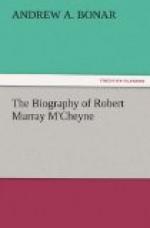It was about the time of his first year’s attendance at the Hall that I began to know him as an intimate friend. During the summer vacations,—that we might redeem the time,—some of us who remained in town, when most of our fellow-students were gone to the country, used to meet once every week in the forenoon, for the purpose of investigating some point of Systematic Divinity, and stating to each other the amount and result of our private reading. At another time we met in a similar way, till we had overtaken the chief points of the Popish controversy. Advancement in our acquaintance with the Greek and Hebrew Scriptures also brought us together; and one summer the study of Unfulfilled Prophecy assembled a few of us once a week, at an early morning hour, when, though our views differed much on particular points, we never failed to get food to our souls in the Scriptures we explored. But no society of this kind was more useful and pleasant to us than one which, from its object, received the name of Exegetical. It met during the session of the Theological classes every Saturday morning at half-past six. The study of Biblical criticism, and whatever might cast light on the word of God, was our aim; and these meetings were kept up regularly during four sessions. Mr. M’Cheyne spoke of himself as indebted to this society for much of that discipline of mind on Jewish literature and Scripture geography which was found to be so useful in the Mission of Inquiry to the Jews in after days.[4]
[4] The members of this Society were—Rev. William Laughton, now Minister of St Thomas’s, Greenock, in connection with the Free Church; Thomas Brown, Free Church, Kinneff; William Wilson, Free Church, Carmyllie; Horatius Bonar, Free Church, Kelso; Andrew A. Bonar, Free Church, Collace; Robert M. M’Cheyne; Alexander Somerville, Free Church, Anderston, Glasgow; John Thomson, Mariners’ Free Church, Leith; Robert K. Hamilton, Madras; John Burne, for some time at Madeira; Patrick Borrowman, Free Church, Glencairn; Walter Wood, Free Church, Westruther; Henry Moncrieff, Free Church, Kilbride; James Cochrane, Established Church, Cupar; John Miller, Secretary to Free Church Special Commission; G. Smeaton, Free Church, Auchterarder; Robert Kinnear, Free Church, Moffat; and W.B. Clarke, Free Church, Half-Morton. Every meeting was opened and closed with prayer. Minutes of the discussions were kept; and the essays read were preserved in volumes. A very characteristic essay of Mr. M’Cheyne’s is “Lebanon and its Scenery” (inserted in the Remains), wherein he adduces the evidence of travellers for facts and customs which he himself was afterwards to see. Often, in 1839, pleasant remembrances of these days of youthful study were suggested by what we actually witnessed; and in the essay referred to I find an interesting coincidence. He writes:




